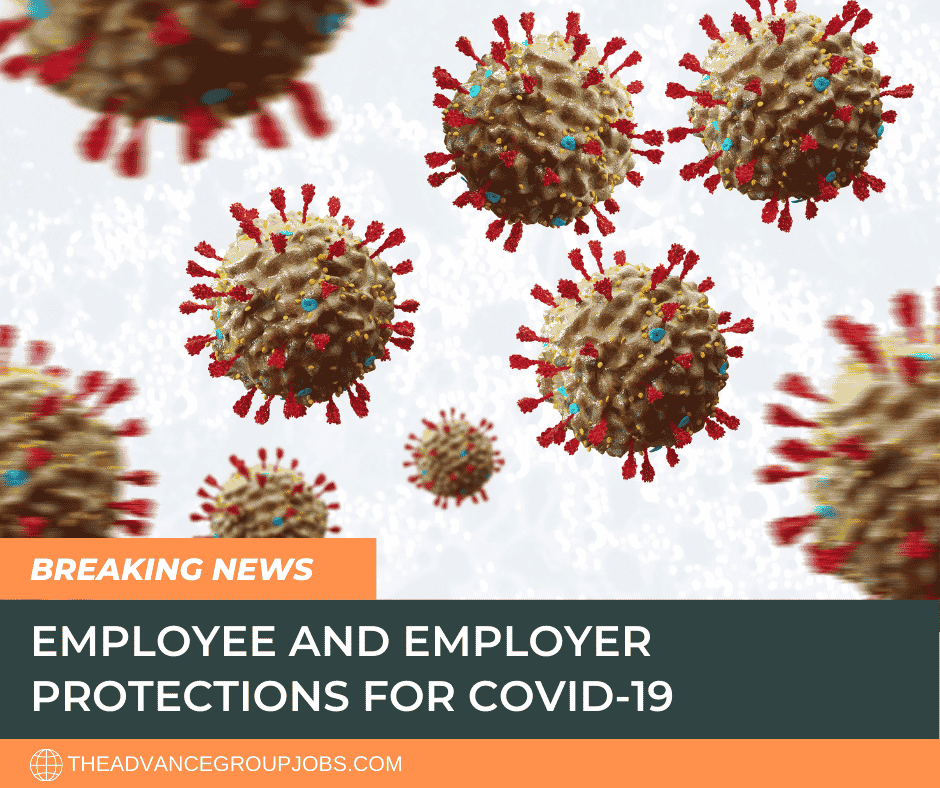Families First Coronavirus Response Act
The Families First Coronavirus Response Act (“FFCRA”) requires certain employers to provide paid sick leave or expanded family medical leave to employees for specific reasons related to COVID-19. The Act affords: (1) two weeks of paid sick leave at the employee’s regular rate of pay where the employee is unable to work because the employee is quarantined; and (2) two weeks of paid leave at two-thirds the employee’s regular rate of pay where the employee is unable to work because of a need to care for an individual subject to quarantine, or care for a child whose school or childcare provider is unavailable for reasons related to COVID-19. Employees who have been employed for at least thirty days are entitled to an additional ten weeks of paid leave where an employee is unable to work because of a need to care for an individual subject to quarantine, or care for a child whose school or childcare provider is unavailable for reasons related to COVID-19.
Covered private employers are those with fewer than 500 employees in the United States. Temporary workers are protected by the FFCRA if either the staffing company or the staffing company client is a covered employer. This means that the temporary worker is entitled to leave under the FFCRA and may sue for backpay, compensatory damages, liquidated damages, attorneys’ fees, pre- and post-judgment interest, injunctive relief, and reinstatement if the FFCRA is violated.
Employee Protection from Retaliation in Michigan
Michigan House Bill 6032, which was signed into law by Governor Whitmer on October 28, 2020, prohibits employers from discharging, disciplining, or otherwise retaliating against an employee, including temporary employees, who is absent from work because they are experiencing symptoms of, or have tested positive for, COVID-19, or had close contact with an individual who displays symptoms of, or tested positive for, COVID-19. Employees lose this protection if they fail to make reasonable efforts to schedule a COVID-19 test within three days after receiving a request from their employer to get tested. Employees are further protected from retaliation for opposing a violation of the law in the workplace or for reporting health violations related to COVID-19.
Employees, including temporary employees, may seek injunctive relief, money damages, or both. These protections are applied retroactively to March 1, 2020 and the size of the employer is irrelevant.
Michigan Occupational Safety and Health Administration Requirements
The Michigan Occupational Safety and Health Administration (“MIOSHA”) implemented additional rules for employers effective October 14, 2020. Under the new MIOSHA rules, businesses resuming in-person work in Michigan are required to develop a written COVID-19 preparedness and response plan, and to train employees on those policies and procedures. Further, employers must provide non-medical grade face coverings to their employees at no cost. Employers are responsible for enforcing mask mandates when employees cannot consistently maintain six feet of separation from others or are in shared spaces, including in-person meetings and in restrooms and hallways. Industry specific requirements for certain industries were also implemented. MIOSHA has already issued citations and penalties to a number of employers for failure to adhere to these requirements.
Employer Protections: Liability Shields in Michigan
Individuals and businesses in Michigan receive a liability shield if they comply with COVID-19-related government orders and statutes. Under Michigan House Bill 6030, employers are immune from liability for a COVID-19-related claim as long as the employer complied with COVID-19-related directives. Immunity will not be denied for “an isolated, de minimis deviation from strict compliance,” meaning the employer is rewarded for a good faith effort to comply with regulations.
Michigan House Bill 6031 provides immunity from liability under MIOSHA for an employee’s exposure to COVID-19 to an employer operating in compliance with COVID-19-related regulations. Similar to HB 6030, “isolated, de minimis deviation from strict compliance” does not defeat the employer’s immunity. Both bills were signed by the governor on October 28, 2020.
What Employers Should Do Now
Employers should ensure they are complying with all rules, regulations, and orders related to COVID-19 to minimize legal exposure and ensure they will receive the liability shield protections afforded by the recent Michigan House Bills. Using temporary employees instead of hiring an employee directly does not shield employers of that liability. Compliance includes strict enforcement of safety rules for all employees, including temporary employees, and refraining from any conduct that could be considered retaliatory following an employee’s absence for reasons related to COVID-19.
This article was written by:
Lynn V. Luther
Attorney at Law
| EASTMAN & SMITH LTD.
ATTORNEYS AT LAW |
|
| Established 1844 – Innovating Daily
Columbus – Detroit – Findlay – Toledo
|
|




